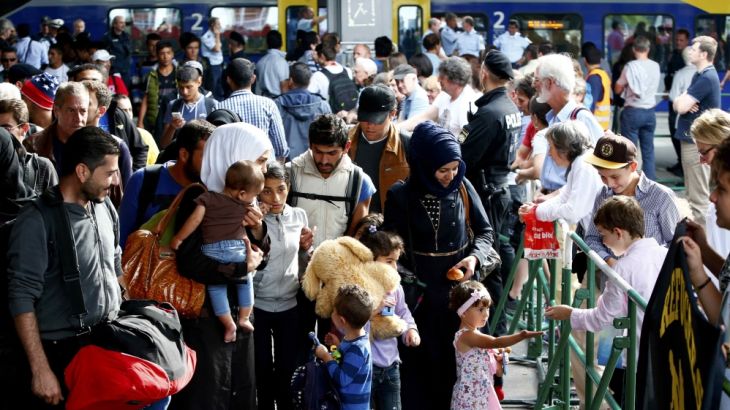Germany imposes border controls over refugee surge
Berlin reinstates controls at the border with Austria following warnings that the country is stretched to capacity.

Germany has temporarily halted train traffic to and from neighbouring Austria as it continues to deal with a surge in refugees.
Austrian rail officials said late on Sunday that services to and from Germany would be stopped at 5pm local time (1500 GMT).
Keep reading
list of 4 itemsPalestinian Prisoner’s Day: How many are still in Israeli detention?
‘Mama we’re dying’: Only able to hear her kids in Gaza in their final days
Europe pledges to boost aid to Sudan on unwelcome war anniversary
It is not known when the services would resume.
Report: Refugees drown as boat capsizes off Greek coast
Thomas de Maiziere, the German interior minister, said on Sunday that Germany had temporarily introduced controls along its border with Austria in an attempt to reduce the number of asylum seekers arriving in the country.
“At this moment Germany is temporarily introducing border controls again along [the EU’s] internal borders. The focus will be on the border to Austria at first,” he said.
|
|
“The aim of these measures is to limit the current inflows to Germany and to return to orderly procedures when people enter the country,” he said, adding that this was also necessary for security reasons.
The refugees must understand that “they cannot choose the states where they are seeking protection”, he told reporters.
Al Jazeera’s Rob Reynolds, reporting from Berlin, said Germany’s decision “underscores the chaotic situation” in Europe, as it tries to handle the situation.
Earlier on Sunday, Germany warned that it was stretched to capacity to accommodate refugees streaming in through Hungary and Austria, with the southern city of Munich struggling to cope with the new arrivals.
More than 13,000 asylum seekers arrived in Munich on Saturday, adding to about 450,000 others who have already made it to the country this year.
“Given the numbers from yesterday, it is very clear that we have reached the upper limit of our capacity,” said a Munich police spokesman.
RELATED: Refugee crisis is a story of children’s resilience
Alexander Dobrindt, Germany’s federal transport minister, said “effective measures” were necessary to stop the influx.
“That includes help for countries from where refugees are fleeing and also includes an effective control of our own borders which also no longer works given the EU’s complete failure to protect its external borders,” Dobrindt said in a statement.
![Refugees arrive at the Austrian border town of Nickelsdorf. Both Germany and the Czech Republic are tightening border controls [EPA]](/wp-content/uploads/2015/09/97e8f052fb964c139296e019433834b9_18.jpeg)
After Germany’s decision on Sunday, the Czech Republic said it would also boost controls on its border with Austria.
Germany’s decision to reinstate controls on its border with Austria meant the Czech Republic is “now the only bypass” for refugees, Interior Minister Milan Chovanec told Czech Television.
‘Ready to help’
The International Organization for Migration said on Friday that more than 430,000 people have crossed the Mediterranean to Europe this year, with more than 2,700 dying en route or going missing.

European Union interior ministers are to hold an extraordinary meeting in Brussels on Monday to seek urgent solutions to a migration crisis unprecedented in the bloc’s history.
Germany and the Czech Republic’s decisions to tighten their borders comes a day after people across Europe marched calling on their governments to help the distraught refugees.
Tens of thousands of people marched through the streets of London, Copenhagen, Berlin, Stockholm, Helsinki, and Lisbon waving placards, saying “Refugee lives matter.”
There have been anti-immigration marches too in the Eastern European capitals. Thousands gathered to protest against accepting refugees in the Polish capital, Warsaw, calling for refugees to “go home”.